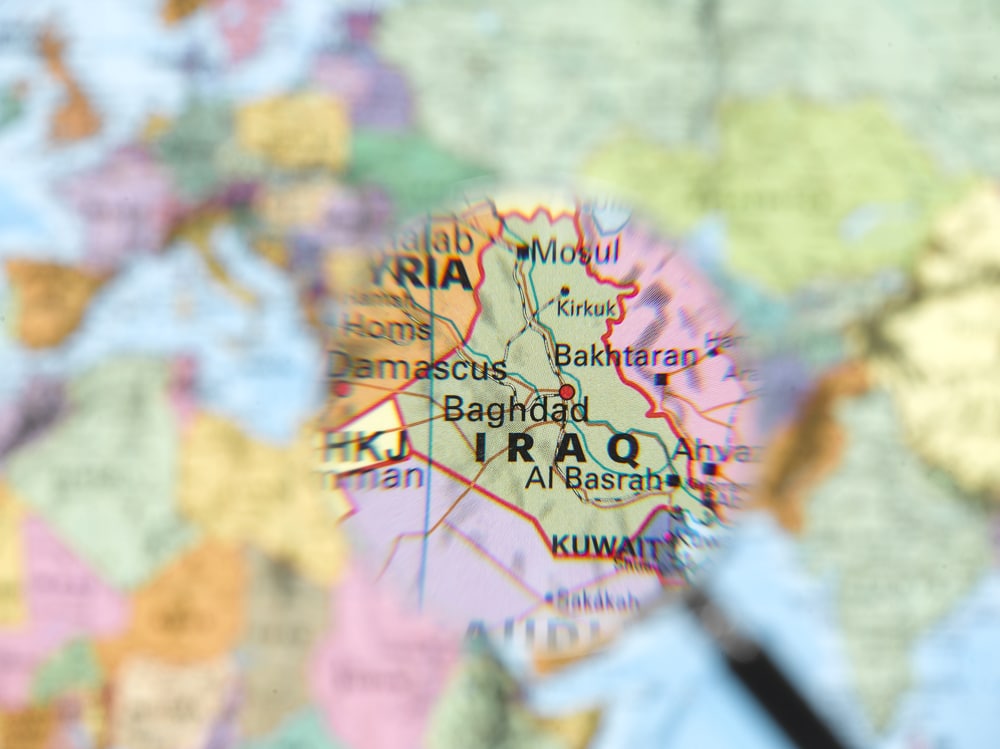Since the beginning of the current war on Gaza, American troops have been under attack across the Middle East, nowhere moreso than in Iraq. The United States has responded with a variety of airstrikes against militants in Iraq, which have repeatedly been condemned as a violation of Iraq’s sovereignty by Prime Minister Mohammed Shia Al-Sudani. These initial strikes were a sign that the United States has failed to pacify Iraq and win over “the hearts and minds” of the country, but they were still in line with past U.S. actions.
However, things changed on January 4 when the United States killed a Popular Mobilization Forces (PMF) deputy commander named Mushtaq Talib al-Saidi of the Harakat al-Nujaba militia, right next to a Ministry of the Interior complex. The PMF, a collection of Shia militias, are part of Iraq’s armed forces. This means that more than twenty years after the invasion of Iraq, the United States has not even managed to create an Iraqi government that it does not feel compelled to bomb. It seems as if the American presence in the country could be close to ending (to no one’s surprise) in abject failure.
The United States justified this airstrike by saying al-Saidi was responsible for attacks on U.S. bases. No evidence backing up this claim was presented, though these groups are known to be hostile to the American presence in the country, so the accusation is plausible. The PMF militias were founded in 2014 to combat the Islamic State, but have since been integrated into Iraq’s government forces and according to Al-Sudani, the PMF units are an “integral part” of Iraq’s armed forces and “fully subject” to the jurisdiction of the state. He said the strike was “no different from a terrorist act.”
Iraq’s Parliament has been trying to expel U.S. troops since the Trump administration illegally murdered Iranian General Qassem Soleimani (who had close ties to the PMF militias) in early 2020. Sudani, who took office in 2022, was already in a difficult position because the Iraqi public supports Palestinians and the U.S. is highly unpopular, but Iraq also relies on American weaponry. Following this airstrike, Sudani is trying to make the “coalition troops,” which include 2,500 Americans, leave the country as soon as possible, though thus far the United States doesn’t even seem to be entertaining the idea of respecting Iraq’s sovereignty.
This attack has received very limited coverage given its immense significance. I think the reason for this is that even many people who opposed the Iraq War—or now wish they would have—cannot handle the extreme failure it demonstrates. It was pretty bad when the Islamic State exploded across Iraq, but even though the government we built in Iraq was weak, we were still allied with Iraq’s government. The invasion of Iraq was dishonestly framed as having some vague relation to combating terrorism, so fighting ISIS in support of the Iraqi government at least fell into the general realm of the initial justification. Alternately, with the airstrike on al-Saidi, the United States has functionally acknowledged—even if no one has said it out loud—that the Iraqi government we lost so much blood and treasure to put in place is a state sponsor of terrorism, and an Iran-aligned one at that! The U.S. declared Harakat al-Nujaba a terrorist organization in 2019, so their integration into the Iraqi government makes it objectively true that Iraq sponsors what the U.S. calls a terrorist organization. This contradiction stayed mostly out of sight, and it isn’t unusual that the U.S. should disagree with an ally about who is a terrorist. But with the airstrike and Sudani’s description of how they sponsor the group, the situation is laid bare for all to see, and it is probably impossible to move past; at least, if anyone should happen to notice.
To zoom out for the bigger picture, it seems like things in Iraq have gone as badly as possible for the United States. Though I don’t like the “global chessboard” perspective, I do understand it. The public-facing Middle East “interests” of the U.S. are roughly as follows: suppress terrorism and Iranian influence while promoting Western access to commerce and keeping our allies such as Israel safe. It was always clear that removing Saddam Hussein was harmful to the goals of suppressing terrorism and Iranian influence, which is why they went overboard by claiming he presented a threat to the outside world. Many people have commented since Hussein’s overthrow that he was uniquely positioned to counter Iran and combat terrorism within Iraq. Though the DC foreign policy set finds it impossible to be neutral on anything, by simply continuing to tolerate Hussein ruling Iraq they could have passively fulfilled U.S. interests regarding the country with no effort or risk. Further, his regime didn’t need outside support to stay in power, so his continued presence didn’t have to bring guilt upon our country, and it would have been possible to allow the trade in civilian goods while periodically making hypocritical announcements about his human rights record, thus covering all of our bases.
Instead, we got the Invasion of Iraq, which has long been considered one of the most drastic errors made by any government in the modern era. What comfort anyone found to soften the pain was in the fact that Iraq at least had a reasonably friendly government that let us do counter-terror operations. That seems to be coming to an end, and coming to an end in such a way that Iraq’s government is our enemy, even if what shame our foreign policy set possesses stops them from admitting it. We can hope that this all leads to the United States finally getting thrown out of Iraq—for good—but as this airstrike shows, it will be an ignominious exit where Iraq is left farther away from fulfilling our security interests than it was in the first place.
































